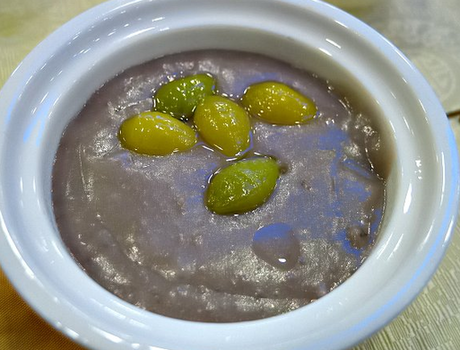Delicacies
Old Fuzhou and the color purple
Updated: 2011-02-07 07:12
By Wei Tian (China Daily)
|
 Yuni, or taro paste, is the signature dessert of Fuzhou and is a delicious treat in spite of its deceptively plain looks. |
Fujian
As an outsider in Fuzhou, I find the best festive experience is a stroll along the traditional folk art area of San Fang Qi Xiang (Three Lanes and Seven Alleys), followed by a nosh up of authentic local snacks at the Lao Fu Zhou (Old Fuzhou Folks) restaurant across the street.
Like any authentic eatery you will find in the Chinatowns from London to New York, it has the most crowded environment, the most impatient waitresses and the most delicious dishes.
Fist-sized fish balls, sesame-buttered noodles and sweet-and-sour litchi meat are some of the tantalizing names you will find on the menu, but it's a deceptively plain-looking dessert simply called yuni (taro paste) that keeps the customers returning.
The grey-tinged purple paste is made from pureed taro, a mauve-colored yam. It is served on a flat plate and topped with a thin layer of toasted sesame seeds, sometimes with candied gingko, red dates or melon seeds added.
Its plain-Jane looks aside, you'll soon discover its hidden virtues when you sample a spoonful of the sweet cream.
"The best yuni is always the simplest," says Chen Maoxi, a 35-year-old local chef. "There is an old saying: 'No skills are needed for making good yuni other than sugar and lard.'"
Steamed taro is skinned and sliced. The taro slices are then mashed with sugar, lard and some spices and cooked in a hot pan until velvety smooth. The paste is finished with a thin layer of melted lard to keep the heat in.
It is this thin layer that makes an art out of eating yuni. You cannot be impatient as the puree is piping hot under that layer of oil.
"It is so easy that anyone can cook it at home, and it is a must-have on the New Year Eve's reunion dinner table," Chen says. "After a feast of meat and seafood, many are satiated with greasy food. A spoonful of sweet and creamy yuni will refresh the palate and stomach."
It's also healthy for you, says nutritionist Huang Taihe, as yuni has plenty of fiber and various minerals.
But eat in moderation, as too much can also upset the digestive system.
It is with an eye on nutrition that restaurants these days have cut down the amount of sugar in the dessert, and replaced the lard.
There is also an anecdote that yuni lovers gleefully tell.
It is said that when Lin Zexu, the famous official of the Qing Dynasty (1644-1911) commissioned to ban the opium trade in Guangzhou, was on a diplomatic mission to persuade the western consuls to give up the drug trafficking.
He was teased with a western-style banquet that included the unfamiliar ice cream.
Lin returned the hospitality by serving yuni at his banquet. When the unsuspecting consuls scooped up the cool-looking dessert, they got more heat than they bargained for and burnt their tongues.
China Daily
Specials

Spring Festival
The Spring Festival is the most important traditional festival for family reunions.

Top 10
A summary of the major events both inside and outside China.

A role model
Alimjan Halik had been selected as the "Cyberspace Personality Who Moved the Hearts of the Chinese in 2010".